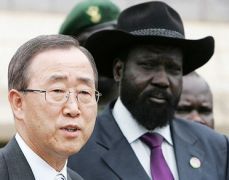UN chief says CPA remains “fragile” but crucial for peace in Sudan
September 4, 2007 (JUBA) — Thousands of enthusiastic well-wishers and dozens of traditional tribal dancers greeted U.N. Secretary General Ban Ki-moon who came to southern Sudan on Tuesday with a warning that its two-year Comprehensive Peace Agreement (CPA) remains “fragile” and crucial to the whole country, including Darfur.
 Some 10,000 U.N. peacekeepers are deployed in the semiautonomous south to enforce the 2005 agreement which ended Africa’s longest civil war. But that deal has been overshadowed by the turmoil of the separate rebellion in Sudan’s western region of Darfur.
Some 10,000 U.N. peacekeepers are deployed in the semiautonomous south to enforce the 2005 agreement which ended Africa’s longest civil war. But that deal has been overshadowed by the turmoil of the separate rebellion in Sudan’s western region of Darfur.
Yet the peace agreement “remains an essential and fragile cornerstone of peace across the whole of Sudan, well beyond Darfur,” Ban said in Juba, the southern region’s capital, on the second day of his trip to Sudan that will also take him to Chad and Libya.
The deal, known as the 2005 Comprehensive Peace Agreement, or CPA, ended 21 years of civil war between Sudan’s Muslim government in the north and the Christian and animist rebels in the south.
Ban said he discussed it Monday with Sudanese President Omar al-Bashir in Khartoum and also here with south Sudanese leader Salva Kiir and members of the southern Sudanese government, urging its “full and prompt implementation.”
Speaking to a gathering later of some 200 civil society workers at Juba University, Ban said the deal “is the blueprint for long-term peace in the country.”
Southern Sudan still has a long way to go before it “can fully recover from decades of conflict and insufficient development,” Ban said, pledging the United Nations will do everything possible to accelerate the recovery.
But he told the southerners: “You must work as hard for peace as you did to uphold the rights of the people of southern Sudan all these years.”
A demarcation of the border between north and south in oil-rich contested zones and slow pace of pulling out Sudanese army soldiers were the main tasks ahead to achieve a solid peace, Ban said.
Kiir told reporters he had “briefed Ban about the progress we have made and the issues … (on which) we have not been able to proceed.”
Ban came here to put a spotlight on the north-south agreement, which calls for a referendum on possible independence for the south in 2011.
A senior U.N. official, briefing reporters earlier this week on condition of anonymity, said there is “a very real fear” in the Sudanese government that the country could disintegrate. He did not elaborate.
At Juba meetings Tuesday, Anglican Bishop Michael Lugor said southerners were waiting for the referendum, and urged Ban to alert the world “that after a few years the south will be free forever and ever.”
Since taking the reins of the United Nations in January, Ban has made resolving the crisis in Darfur one of his top priorities. This is his first trip to the country as U.N. chief and his first-ever trip to the south.
During their talks in Khartoum, Ban said al-Bashir had “again reaffirmed his commitment to the full implementation of the CPA” and also reassured the U.N. leader that his government was ready to cooperate for the deployment of a joint U.N. and African Union force in Darfur.
Sudan had for months resisted a push for U.N. peacekeepers to replace the overwhelmed AU force now in Darfur, where 200,000 people have died and 2.5 million have been displaced in four years of fighting. But Ban said Khartoum has now pledged full support to the July 31 Security Council resolution that plans for 26,000 U.N. and AU peacekeepers to deploy jointly in Darfur.
“Time is of the essence. And the government’s cooperation is essential on a range of practical matters,” Ban said, adding he appreciated al-Bashir’s “willingness to cooperate fully.”
Darfur violence has largely worsened since a peace agreement was signed in May 2006, and Ban and his U.N. team are pressing to jump-start peace negotiations between the splintered Darfur rebels groups and the government. The U.N. hopes the new political talks will get under way in October.
Ban also said al-Bashir had agreed to grant safe passage to Suleiman Jamous, an ailing Darfur rebel chief currently in a U.N. hospital, so he can fly to Kenya for medical treatment. Jamous had been unable to leave the U.N. hospital for fear Sudanese authorities would arrest him.
A senior U.N. official, speaking on condition of anonymity because of the sensitivity of the issue, said Jamous was expected to be released Tuesday and hopefully would be able to leave the country, but that he would still need an exit visa from the authorities.
Ban also announced the appointment Tuesday of Pakistani diplomat Ashraf Qazi, now top U.N. envoy to Iraq, as the new U.N. representative in Sudan. The appointment came nearly a year after Jan Pronk, the previous U.N. representative in the country, was expelled from Sudan for his comments on Darfur violence.
Ban praised Qazi’s “diplomatic skills” and said he hoped Qazi would gain the full support of Sudanese authorities for the AU-U.N. hybrid force deployment in Darfur.
(AP)
